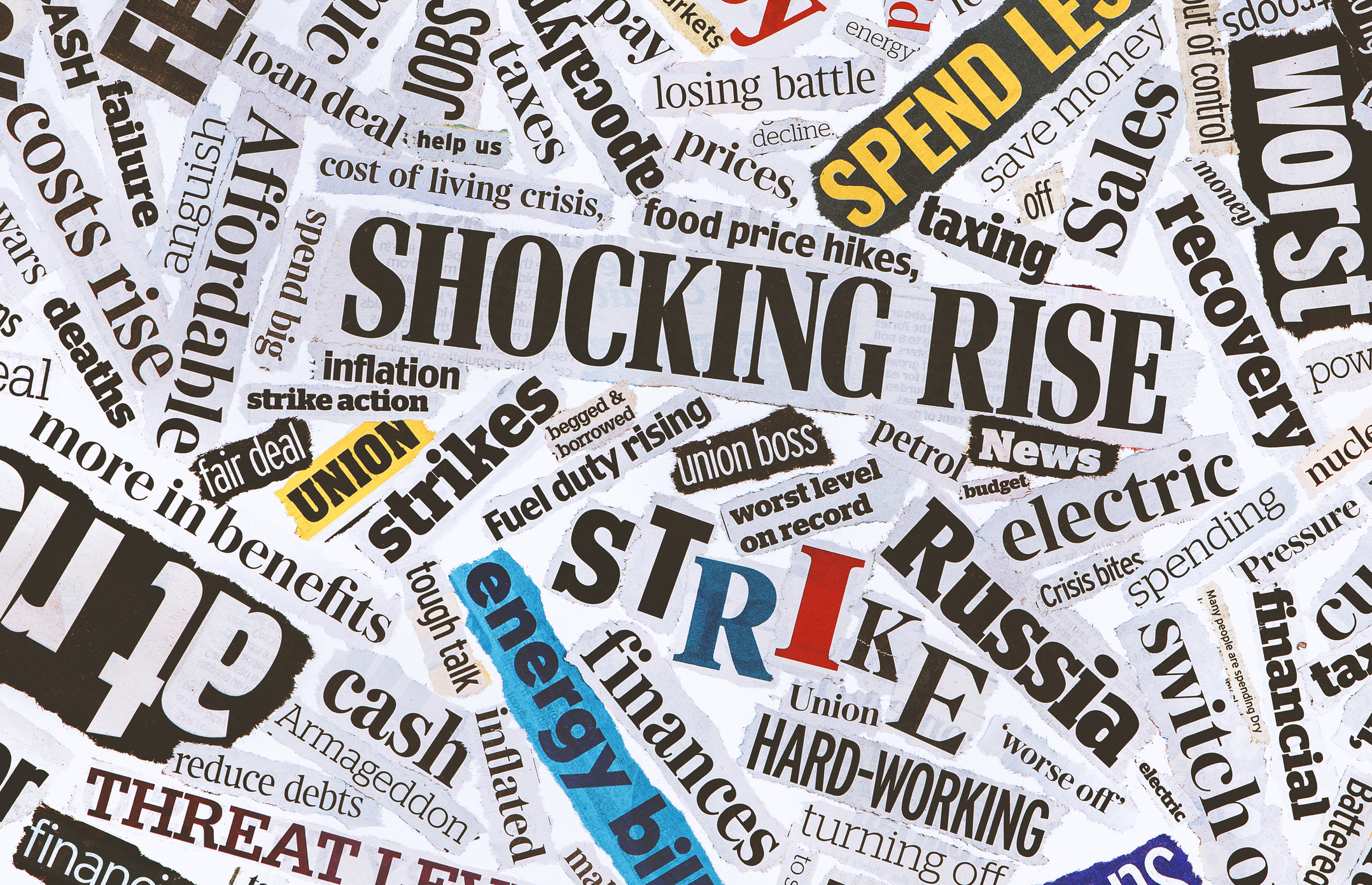Recession-Proof Stocks: The Best Stocks to Buy for a Recession
When you look for recession-proof stocks to buy, focus on low-risk, low-volatility businesses.


Profit and prosper with the best of Kiplinger's advice on investing, taxes, retirement, personal finance and much more. Delivered daily. Enter your email in the box and click Sign Me Up.
You are now subscribed
Your newsletter sign-up was successful
Want to add more newsletters?

Delivered daily
Kiplinger Today
Profit and prosper with the best of Kiplinger's advice on investing, taxes, retirement, personal finance and much more delivered daily. Smart money moves start here.

Sent five days a week
Kiplinger A Step Ahead
Get practical help to make better financial decisions in your everyday life, from spending to savings on top deals.

Delivered daily
Kiplinger Closing Bell
Get today's biggest financial and investing headlines delivered to your inbox every day the U.S. stock market is open.

Sent twice a week
Kiplinger Adviser Intel
Financial pros across the country share best practices and fresh tactics to preserve and grow your wealth.

Delivered weekly
Kiplinger Tax Tips
Trim your federal and state tax bills with practical tax-planning and tax-cutting strategies.

Sent twice a week
Kiplinger Retirement Tips
Your twice-a-week guide to planning and enjoying a financially secure and richly rewarding retirement

Sent bimonthly.
Kiplinger Adviser Angle
Insights for advisers, wealth managers and other financial professionals.

Sent twice a week
Kiplinger Investing Weekly
Your twice-a-week roundup of promising stocks, funds, companies and industries you should consider, ones you should avoid, and why.

Sent weekly for six weeks
Kiplinger Invest for Retirement
Your step-by-step six-part series on how to invest for retirement, from devising a successful strategy to exactly which investments to choose.
Uncertainty about the impact of tariffs, the path of inflation and the trajectory of interest rates, as well as a general fear that stocks remain overpriced, top the list of reasons to fear a slowdown. As such, it's not a bad idea for investors to have recession-proof stocks on their radar.
And with weakening in the labor market, more and more conversations about "stagflation" and "recession" are popping up.
Even the Federal Reserve is cautious about what comes next, as evidenced by the central bank resuming its rate-cutting campaign this September due to what it says is "elevated" uncertainty to the economic outlook and rising "downside risks to employment."
The Fed followed up with a second 25-basis-point cut to the target range for the fed funds rate in October. But, with FOMC members wondering again about the impact of tariffs on price stability, another such move in December is now in doubt.
If you're leery of chasing overpriced and volatile growth stocks and are worried about an economic slowdown, the best recession-proof stocks can provide a margin of safety for your portfolio through the market cycle.

What is a recession?
A common definition of a recession is two consecutive quarters in which the U.S. economy has shrunk, as measured by the growth rate for gross domestic product (GDP).
This concept applies to other nations, the global economy and even other financial metrics.
For instance, some stock market analysts will refer to an "earnings recession," where the average growth rate of the largest stocks has been negative for two quarters in a row. The most recent earnings recession occurred in late 2022 through mid-2023.
Generally, "recession" means a sustained decline rather than a short-term disruption.
Recessions can happen for many reasons: a global financial crisis like we saw in 2008, geopolitical unrest such as the wars in Ukraine or Gaza or even a global pandemic.
Although economists and traders alike sometimes detect waning momentum, unexpected events are often to blame for meaningful downturns that catch even the smartest businesses, consumers and investors by surprise.

The best recession-proof stocks
Whether you're worried about short-term troubles or you just want a resilient portfolio that stands up to the unexpected, your approach to identifying the best stocks to buy should be similar.
Here's what to look for when researching recession-proof stocks:
Avoid cyclical stocks: The economy tends to run in cycles, and some businesses do very well when things are booming but suffer mightily when recession strikes.
These are called "cyclical stocks" because they're very sensitive to trends in business or consumer spending.
Think of hotels that depend on strong travel spending, automakers that sell high-priced cars or retailers that rely on Americans taking frequent trips to the mall.
Stick to defensive sectors: Defensive sectors may not have as much upside when things are booming, but they tend to be more stable when things get tough.
Examples of defensive stocks include electric utilities and businesses that sell consumer staples such as soap and packaged foods. You don't stop turning on the lights, showering or eating just because the economy is a bit rough, after all.
Defensive stocks depend on strong baseline demand through the economic cycle.
Go bigger: It's generally true that the larger companies on Wall Street are more stable than the smaller ones. They have cash reserves to fall back on, not to mention big brand names and rich histories.
And they have what Warren Buffett characterizes as "moats" of safety to protect them from short-term disruptions.
Although smaller companies can move more quickly to take advantage of new opportunities, they're usually among the first to suffer when times get tough. Going bigger helps reduce your risk profile.
Prioritize dividends: Large companies with stable profits often spread the wealth via regular dividends.
This flow of profits back to shareholders sweetens total returns, which is nice. It also establishes a level of reliability in underlying operations. Cutting dividends is a huge black eye for a stock.
A business that generates cash flow sufficient to support regular payouts — and, in the best-case scenario, backs one of those stocks known for dependable dividend growth — should give you confidence through the economic cycle.
Data is as of November 14.

Altria Group
- Market value: $97.7 billion
- Sector: Consumer staples
- Dividend yield: 7.3%
It's hard to find a stock that provides more stability than tobacco giant Altria Group (MO).
This consumer icon is among the best recession-proof stocks to buy for long-term stability and consistent dividends, with a yield that's more than six times the S&P 500's 1.2% payout.
Those dividends are likely to keep growing: Altria has an amazing track record of 56 years of consecutive dividend increases — and that’s despite not a lot of growth in cigarettes.
At the same time, Altria has generated strong earnings year after year thanks to its powerful brands, including Marlboro cigarettes, Skoal smokeless tobacco and NJOY vaping products.
MO might not double your money this year. But if you want a defensive investment, it's a go-to option among consumer staples stocks.

Digital Realty Trust
- Market value: $54.3 billion
- Sector: Real estate
- Dividend yield: 3.1%
Real estate investments can be risky in a recession as troubled shops struggle to pay rent at their storefronts, and homeowners risk foreclosure.
Digital Realty Trust (DLR) is a unique opportunity in the sector because, while it owns a bunch of property, its business is data centers and colocation services that power the digital economy.
After all, the data stored in "the cloud" has to live on servers somewhere — and DLR owns the hardware for major clients including Amazon.com (AMZN) and Oracle (ORCL).
As such, DLR isn't subject to the same pressures as real estate firms serving brick-and-mortar retailers or corporate office space.
It is, however, structured as a real estate investment trust, or REIT, and must deliver 90% of taxable income back to its shareholders, creating a mandate for big and reliable dividends.
With more than 300 data centers worldwide and operations that span more than 25 countries, this is one of the best REITs to buy, because it has both the scale and expertise to weather most downturns.

Lloyds Banking Group
- Market value: $71.9 billion
- Sector: Financials
- Dividend yield: 2.7%
London-based Lloyds Banking Group (LYG) has been around since 1689. It's one of the oldest and most respected banking and insurance firms in the world.
But perhaps LYG is not as familiar to you as other financial stocks such as JPMorgan Chase (JPM). LYG's share price is up almost 86% for the year to date, driven by investors rotating into the relative stability of European stocks when compared to their American peers.
Bank stocks can be highly cyclical investments, as mortgages and business loans are dependent on consumers and entrepreneurs feeling good about their finances. But while the U.S. stocks are facing recession risks, LYG is cruising along just fine.
The firm is no small fry in the sector, either, and is on par with regional banks such as M&T Bank (MTB) or insurer American International Group (AIG) in size.
If you're worried about the impact of a U.S. economic downturn, this established U.K. leader is a top recession-proof stock to buy now for international diversification.

Lockheed Martin
- Market value: $107.8 billion
- Sector: Industrials
- Dividend yield: 3.0%
In an age of geopolitical uncertainty, aerospace and defense leader Lockheed Martin (LMT) stands out for its opportunity to succeed in the years ahead.
The second Trump administration is focused on cutting all manner of government programs. But long-standing Republican loyalty to the Department of Defense means significant cuts for military contractors such as LMT are unlikely.
The stock is one of the long-term leaders in the defense sector thanks to past innovations such as the F-35 Lightning, the F-117 Nighthawk stealth fighter, the F-16 Fighting Falcon and other impressive war machines.
From an income perspective, the blue chip stock has a strong record of dividends with a generous $3.45 quarterly payout that's more than double what it was a decade ago.
While there's risk to certain businesses in a downturn, chances are that Lockheed, like many recession-proof stocks, enjoys historical benefits that insulate it from any cutbacks.

NextEra Energy
- Market value: $174.7 billion
- Sector: Utilities
- Divided yield: 2.7%
Utilities are always go-to stocks during an economic crisis, as power is a necessity supported by strong demand through good times and bad.
NextEra Energy (NEE) is the largest publicly traded utility on Wall Street. That makes it the logical choice in the sector and one of the best recession-proof stocks for investors.
NextEra bills itself as the world's largest generator of wind and solar energy and is rapidly diversifying its portfolio of energy-generation facilities. A long-term focus ensures it stays profitable and in line with any sustainability goals in the future.
After a recent bump in its dividend to 56.65 cents per share each quarter, the stock's dividend yield is 2.7%. With payouts only about 60% of next year's earnings, NextEra has plenty of room for future increases.
That makes NEE safe from any near-term volatility that may strike the U.S. economy and makes it one of the best recession-proof stocks.

How to prepare your portfolio for a recession
The desire to be defensive and protect your hard-earned cash is natural. But it's important to note that by simply investing in recession-proof stocks, you'll probably leave some long-term profits on the table.
If you completely ignore growth stocks, including smaller start-ups and/or aggressive tech disruptors, you might be disappointed when you don't share in the good times as often as your peers.
And even the best recession-proof stocks can stumble — there's no guarantee your money is 100% protected either way.
A balanced approach is almost always the best course of action, then. That includes recession-proof stocks as well as other instruments in a diversified portfolio built to provide consistent returns through market cycles.
Your personal risk tolerance informs how much or how little of each investment you focus on. The bottom line is that going "all in" on recession-proof stocks may be just as risky as putting every penny behind small and risky growth stocks.
Looking at the whole array of options out there is usually the best course of action for the typical investor.
Related content
Profit and prosper with the best of Kiplinger's advice on investing, taxes, retirement, personal finance and much more. Delivered daily. Enter your email in the box and click Sign Me Up.

Jeff Reeves writes about equity markets and exchange-traded funds for Kiplinger. A veteran journalist with extensive capital markets experience, Jeff has written about Wall Street and investing since 2008. His work has appeared in numerous respected finance outlets, including CNBC, the Fox Business Network, the Wall Street Journal digital network, USA Today and CNN Money.
-
 The Cost of Leaving Your Money in a Low-Rate Account
The Cost of Leaving Your Money in a Low-Rate AccountWhy parking your cash in low-yield accounts could be costing you, and smarter alternatives that preserve liquidity while boosting returns.
-
 I want to sell our beach house to retire now, but my wife wants to keep it.
I want to sell our beach house to retire now, but my wife wants to keep it.I want to sell the $610K vacation home and retire now, but my wife envisions a beach retirement in 8 years. We asked financial advisers to weigh in.
-
 How to Add a Pet Trust to Your Estate Plan
How to Add a Pet Trust to Your Estate PlanAdding a pet trust to your estate plan can ensure your pets are properly looked after when you're no longer able to care for them. This is how to go about it.
-
 How to Add a Pet Trust to Your Estate Plan: Don't Leave Your Best Friend to Chance
How to Add a Pet Trust to Your Estate Plan: Don't Leave Your Best Friend to ChanceAdding a pet trust to your estate plan can ensure your pets are properly looked after when you're no longer able to care for them. This is how to go about it.
-
 Want to Avoid Leaving Chaos in Your Wake? Don't Leave Behind an Outdated Estate Plan
Want to Avoid Leaving Chaos in Your Wake? Don't Leave Behind an Outdated Estate PlanAn outdated or incomplete estate plan could cause confusion for those handling your affairs at a difficult time. This guide highlights what to update and when.
-
 I'm a Financial Adviser: This Is Why I Became an Advocate for Fee-Only Financial Advice
I'm a Financial Adviser: This Is Why I Became an Advocate for Fee-Only Financial AdviceCan financial advisers who earn commissions on product sales give clients the best advice? For one professional, changing track was the clear choice.
-
 Nasdaq Slides 1.4% on Big Tech Questions: Stock Market Today
Nasdaq Slides 1.4% on Big Tech Questions: Stock Market TodayPalantir Technologies proves at least one publicly traded company can spend a lot of money on AI and make a lot of money on AI.
-
 I Met With 100-Plus Advisers to Develop This Road Map for Adopting AI
I Met With 100-Plus Advisers to Develop This Road Map for Adopting AIFor financial advisers eager to embrace AI but unsure where to start, this road map will help you integrate the right tools and safeguards into your work.
-
 The Referral Revolution: How to Grow Your Business With Trust
The Referral Revolution: How to Grow Your Business With TrustYou can attract ideal clients by focusing on value and leveraging your current relationships to create a referral-based practice.
-
 This Is How You Can Land a Job You'll Love
This Is How You Can Land a Job You'll Love"Work How You Are Wired" leads job seekers on a journey of self-discovery that could help them snag the job of their dreams.
-
 Fed Vibes Lift Stocks, Dow Up 515 Points: Stock Market Today
Fed Vibes Lift Stocks, Dow Up 515 Points: Stock Market TodayIncoming economic data, including the January jobs report, has been delayed again by another federal government shutdown.
